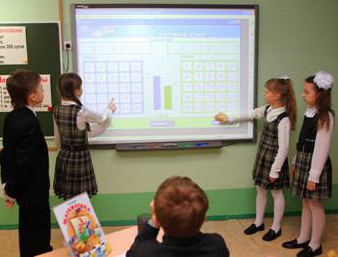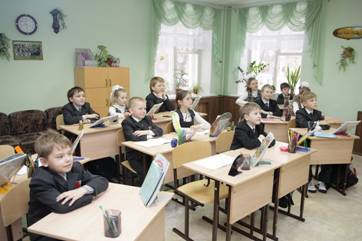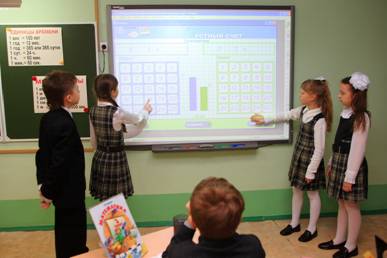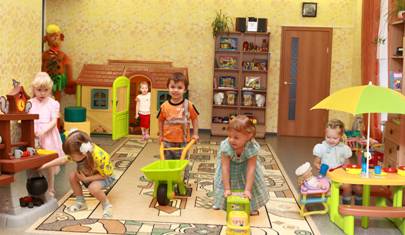

Volume:1, Issue: 2
Sep. 1, 2009


Sep. 1, 2009
SYNOPSIS:
Professor Zakharova analyzes the development of a concept and a system for creating life-long learning opportunities for the citizens of the City and region of Perm, Russia. Her article describes the birth of the concept and the development of each aspect of its evolution. It begins with a traditional Russian school and grows into a complex of innovative educational institutions that spans preschool to adult education; all with the same philosophy of continuous learning as a way of life.
One of the most important characteristics of contemporary education is the quality of its development. The creation and development of a system for “continuous learning” or “life long learning” is based on the principal of the deep formation of the individual. This is an essential condition for guaranteeing quality.
In our opinion, “continuous learning” necessitates the introduction of innovative methods. One of these is the importance of developing the student’s personality along with his/her mind. It will greatly motivate the student in the process of mastering knowledge. A successful adaptation to the social system is very important in today’s world.
It is no secret that many people in facing today’s financial crisis thirst for stability in their lives and seek to understand the present and the future, but they do not want fundamental change. To be exact, under these very conditions, it is important to demonstrate the importance of “continuous learning” and its attraction as an entity comprised of connected links that are interdependent and actually complement one another.
In the Perm region2, non-state schools were the first to initiate a system of “continuous learning.” It was a group of energetic teachers from this background, full of good, Russian, as well as foreign education experience, who created what we now call, Association “THE 21ST CENTURY.” This humanistic organization stretches from our kindergarten called “Constellation Unicus;” to a “European->
ORIGINS
The first link in this large educational enterprise was the private school, “Ex Professo” which was formed on the principle: “Believe in us and together we will start from the present and build a new future.” And people believed. A small group of learners became the first students in 1997. The main problem for the school staff, however, was in facing the reality of “thinking outside the boxes” of study times and educational space in order to meet the needs of each student with a rich content that would permit every participant in the interaction of the school, student as well as teacher, to maximize his/her own potential.

“Ex Professo” is a unique, educational environment for children from grade 1 to grade 11. The main features of the school are its creativity; subject content; pedagogical organization; its solutions for the development of modern, high-level, academic programs; and its system for student character formation, all of which are aimed at assisting young people to adapt to the modern Russian and as well as the international, education arena.
In this European->3 at this school. Within this broad expanse of time, in addition to their regular classes, they are able to participate in optional and extra-curricular activities, study groups and sports. For example, the school has a sports club, a gym, a special room for painting called “Vdokhnoveniye” (Inspiration), and a school newspaper, “Vesti Ex Professo” (Ex Professo News). Student life is therefore rather exciting because the children just about live in their school. They have their own cafeteria where they and their teachers can eat three times a day. After a dinner that is as fine as home cooking, the students can do their “homework” under the supervision of their teachers.
Some comments about “Ex Professo” from students include the following:
“Our school is a special world where people live in harmony with each other like in a warm and comfortable house. - Our school does not select its students because of their knowledge and special abilities. - Each student in the school has a chance to develop his skills in any sphere he wants. -Many teachers in our school use computer and information technologies to make their lessons more interesting and to help us learn.
Each year a scientific conference is held in our school and it is a unique event. Exhibits of our work in both audio and video formats draw a lot of attention to the real-life problems that we are exploring. -We participate in different competitions throughout the year and our work with computer technologies helps us to do this.”
Five years ago the school acquired an “interactive ‘blackboard’” which the younger children as well as the older ones find to be a wonderful tool for making lessons more interesting and effective.
“Our school is a special world where people live in harmony with each other like in a warm and comfortable house. - Our school does not select its students because of their knowledge and special abilities. - Each student in the school has a chance to develop his skills in any sphere he wants. -Many teachers in our school use computer and information technologies to make their lessons more interesting and to help us learn.
Each year a scientific conference is held in our school and it is a unique event. Exhibits of our work in both audio and video formats draw a lot of attention to the real-life problems that we are exploring. -We participate in different competitions throughout the year and our work with computer technologies helps us to do this.”
Five years ago the school acquired an “interactive ‘blackboard’” which the younger children as well as the older ones find to be a wonderful tool for making lessons more interesting and effective.

In October of 2006, “Ex Professo” participated in the All-Russian stage of an international competition organized by the Canadian company, Smart Technologies, for the best video about the interactive program “SMART.” Our children demonstrated their skills by creating two videos; one took “3rd Place in All of Russia” and the other video received a special prize and diploma for “Best Director.” At the next stage of this world competition which took place in Canada, one of our videos took “First Place in Europe.” These experiences impressed on every member of our school the importance and potential of information technology in the life of a school, a business, or a community. “Ex Professo” is unique in Perm because it makes use of communication technology in developing the potential of its students while it prepares them for life in an ever-changing world.
Time passed, “Ex Professo” grew up, and a new idea began to form in our minds. What if we start at the beginning and create a kindergarten that would prepare its students explicitly for “Ex Professo?” And “Ex Professo” would prepare students for a college based on our beliefs. This would create a series of links: kindergarten-school4-college, forming a chain for the preparation of mature and professional people.
The NEXT LINK

From its creation, the staff of our kindergarten, “Sozvezdie Unicus” or “Constellation Unicus” has defined its work as the development of each child’s individual personality through the cultivation of various spheres including health care. The facility is safe, comfortable, and well-equipped while the program of instruction is well thought out, organized, and employs modern technologies in order to provide the highest quality of pre-school education.
“Constellation Unicus” provides a great variety of additional services aimed at helping students form aesthetic taste, communication abilities, thinking process, the development of gross and fine motor functions, as well as preparation for entering the next level of schooling. One exciting aspect of this kindergarten’s program involves the students in the use of English to discover information about the contemporary world through a captivating, interactive game. Another aspect deals with the health of the students. In this realm, the school contains space for exercise therapy, a sauna, and a swimming pool. The children are offered dietary meals, mineral water, and even necessary medicines.
Despite its youth, “Constellation Unicus” has won public recognition. In October of 2008, the staff of the kindergarten attached to “Ex Professo” became a prizewinner in the contest, “The Best Kindergarten in Russia, 2008.” And this is not our kindergarten’s first award. In 2005 The Russian Academy of Creative Pedagogics presented “Constellation Unicus” with the title, “Model Kindergarten.” In 2006 in conjunction with “Ex Professo,” it shared in the honors for the European Region of the Smart Technologies video contest.
Sociological research carried out in the kindergarten during 2008 indicated that the children had been transformed into “self-confident” students. This assured their parents that the program of development at “Constellation Unicus” was good for children. Their children found joy there each day. Bright faces glow during the lessons of the “Raduga” (Rainbow) program and turn serious during “Razvitiye” (Development) lessons. These young ones are the future of our nation. We can discern their self-created personalities, as they move upward from grade to grade, not like a speedy escalator, but step by confident step.
THE “COMMUNITY” COLLEGE
The Prikamsky Contemporary College of the Social Humanities was the next stage in the creation of our system of “non-stop” education. Apparently this college has already made a place for itself as a “vocational” training institution. It was given state recognition and accredited by the Russian Federation Ministry of Education in 2006. The college has increased in size and capability and now is located on two campuses with well equipped lecture halls, three computer-technology classrooms, a business center, a library boasting a large number of new books, and in addition, a specialized, electronic library. The college also continues our unique focus on student health care and nutrition.
Instruction at the College of Social Humanities, a “community college >
The extracurricular life of the students should not be left without its share of attention. All who wish may participate in sports, hobby clubs and other interest groups. They sponsor regular holiday celebrations and other fun activities. College student clubs are often invited to take part in concerts and other activities organized by the City of Perm and the region. One can hardly miss noticing the participation of our College of the Social Humanities students in various city activities because they often win prizes at these events.
Five or six years ago, no one would have believed that a diploma from such an institution as the Prikamsky Contemporary College of the Social Humanities would be worth anything. Nowadays, such a belief is no longer possible. In 2008 the college received an award for its contribution to the educational and moral development of the region. Our college was recorded in the All-Russia National Registry under the category, “Elites of Russian Education,” as one of “The Best Community Colleges in Russia.” Graduates of its law and economics departments have found good jobs with important companies. Most of these graduates have imbibed our spirit of “life-long learning” and continue their studies in the Prikamsky Social Institute.
THE ULTIMATE STAGE

The final level of our system of “continuous education” is the Prikamsky Social Institute. The mission of the institute is to provide students with a high quality education which will allow them to adapt successfully to contemporary social and economic conditions and find success and admission to the highest levels of professional achievement and acclaim.
Although the institute provides its students with modern study materials like interactive SMART boards and classes are conducted in bright and well equipped lecture halls, the central figure of the pedagogical process remains the teacher. More than 70% of the teachers in the Prikamsky Social Institute have advanced academic degrees. These pedagogues make use of a wide variety of educational technologies to enhance student involvement in the process of learning. They regularly employ such strategies as business simulation activities; round table discussions; training seminars; video courses; and such specialized educational software in the business and law departments as: “1C-Enterprise,” “1C-Bookkeeping,” “Consultant Plus,” and “Guarantor.”
A unique variety of educational models and levels permits each student to select his/her own optimal and most convenient path towards specialization. For example, a high school graduate can complete the requirements for a normal degree by studying in the Prikamsky Contemporary College of the Social Humanities and after graduation can get a job and continue studies through the Social Institute by correspondence. Weekend classes at the Social Institute allow working students to continue their educational activities on their days off. Such a flexible timetable lets a student pursue an education without interruption.

Those who have already earned degrees and have pursued higher professional education but still wish to raise their professional skill levels can do this through the Prikamsky Social Institute which offers a wide variety of courses on different levels designed for experienced educators, managers, accountants, psychologists, and the like. In accordance with our belief in “life-long learning,” retirees can also pursue studies through the institute. These grandmothers and grandfathers make the most diligent and inquisitive students because of their past experiences and the view that they have their whole lives before them.
In 2006, the Prikamsky Social Institute was recognized for its work and received accreditation from the federal agency for the supervision of education and science of the Ministry of Education of the Russian Federation. The following year the institute achieved further public recognition by winning an international prize titled, “Leaders of Economic Development in Russia” along with another award including a cup and the title, “Leader of Economic Growth-2007.” In 2008 the institute was listed in the All-Russia Registry under the category of “Elites of Russian Education” as one of the “Best Russian Institutes of Higher Learning.” The rector of the institute, Professor N. N. Zakharov has been awarded the Order of Public Recognition and called “An Honorable Russian Citizen” in appreciation for the work of the institute and for his contribution to the training of specialists who have enhanced the nation. Both Professor N. N. Zakharov and the institute’s first vice-president, N. S. Zakharova were awarded the “Order of A.S. Makarenko.” This is the highest honor given by Russia for public service and progress in educational activity.
1 Zakharova, Natalia S., [In Russian: Наталья Сергеевна Захарова], Professor, Ph.D., First Vice-President, the Prikamsky Social Institute, Perm, Russia.
2 Perm, Russia is located in the foothills of the Ural Mountains on the edge of European Russia. It is situated on the Kama River, a tributary of the Volga River. Institutions along the river are often identified as such by use of the word Prikamskii, meaning “by the River Kama.”
3 The traditional Russian school day usually ends at 2:30. Many children go home or to other state funded venues for extra-curricular activities.
4 Russian schools begin at first grade and continue to grade 11, and they are called secondary schools.
Home | Copyright © 2025, Russian-American Education Forum